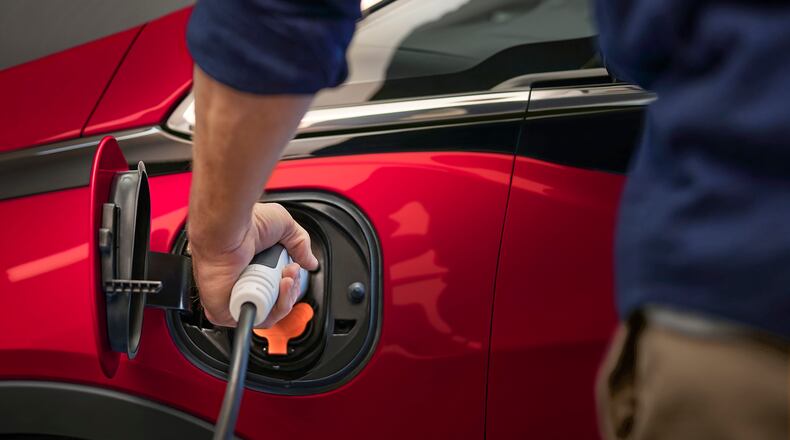From agriculture to airplanes, Georgia has long led the South’s economy.
In the next economic transition - the clean economy transition - Georgia can lead not just the South, but the world.
As long as politics and political grandstanding doesn’t get in the way, that is.
In January alone, companies announced four major clean energy projects in Georgia that are expected to employ more than 3,100 people to build solar panels, batteries and other electric vehicle parts. For comparison’s sake, that’s more people than live in the Atlanta suburbs of Lithonia or Avondale Estates. Only New York had more clean energy announcements than Georgia last month, according to a new monthly review by the national nonpartisan business group E2 (Environmental Entrepreneurs), which I lead.
In Cartersville and Dalton, Qcells announced plans for what is expected to be the biggest solar panel production operation in the Western Hemisphere, a $2.5 billion investment that will create 2,500 jobs.
In Roswell, SK Battery America last month announced a 200-employee IT center that will serve the factory the company already is building in Commerce, where another 3,000 workers will make batteries for Ford’s new F-150 Lightning and Volkswagen’s ID.4 electric vehicles.
And in Bulloch County, near Statesboro, EcoPlastic Corp. announced in January it will create more than 450 jobs making parts for Hyundai’s previously announced $5.5 billion, 8,100-employee electric vehicle factory near Savannah.
Credit: contributed
Credit: contributed
It’s no wonder Republican Gov. Brian Kemp in his inauguration speech last month declared he wants to make Georgia the “electric mobility capital of America,” while Democrat Vice President Kamala Harris traveled to Atlanta recently to trumpet how federal policies are creating new clean energy opportunities in Georgia and every other state. That giant Qcells solar panel factory? It isn’t coming up from the ground in some left-wing enclave; it’s in the district of conservative firebrand U.S. Rep. Marjorie Taylor Greene.
Truth is, clean energy jobs aren’t Republican or Democrat.
Of the top 10 states for clean energy jobs last year, half were red states; half were blue states. Two years ago, an E2 study of clean energy jobs by congressional district level showed there were almost as many clean energy jobs in Republican districts as Democrat districts. As recent clean energy announcements indicate, these jobs are now trending even more toward red states and districts.
What’s now turbocharging these jobs in Georgia and nationwide is the federal Inflation Reduction Act (IRA) passed by Congress just six months ago. The IRA created new tax credits for manufacturers like Q Cells and Hyundai and EcoPlastic to invest and build new factories. It also created tax credits for consumers, utilities and other businesses who buy and install clean energy products like solar panels or high-efficiency appliances or attic insulation, or electric vehicles.
Unfortunately, some of Georgia’s representatives in the U.S. House seem to care more about politics than they do about creating jobs and driving economic growth in Georgia and making America more competitive globally.
No Republican House member voted in favor of the IRA, even though the benefits of the policy are now rolling out in their districts. When President Joe Biden used his recent State of the Union address and Vice President Harris used her speech in Atlanta to talk about the economic gains from the IRA and other federal clean energy policies, their political opponents were quick to pounce, ignoring the obvious economic benefits we’re already seeing in Georgia and elsewhere.
Now, House Republicans are trying to roll back or defund parts of the IRA, just to give Biden and congressional Democrats who passed the plan - including senators Jon Ossoff and Raphael Warnock - a political punch in the eye. Earlier this month, U.S. Rep. Andy Ogles of Tennessee and 19 other Republicans filed a bill to repeal the IRA, claiming it was hurting the economy - even as clean energy companies were announcing hundreds of new jobs in their states because of the legislation.
Georgians know there isn’t anything political about jobs, investments and making America more competitive. The state’s Republican delegation to Congress ought to realize that too. They have the opportunity to break the cycle of politics for politics’ sake in Washington and instead show how - when it comes to creating jobs and building a cleaner economy – we can all work together.
If they do so, Georgia can lead not just the South, but the world, in the next great economic transition - the transition to a clean economy.
Bob Keefe is executive director of national nonpartisan business group E2 and author of “Climatenomics: Washington, Wall Street and the Economic Battle to Save Our Planet.” Keefe was The Atlanta Journal-Constitution’s Washington correspondent from 2009-2011.
About the Author
Keep Reading
The Latest
Featured




